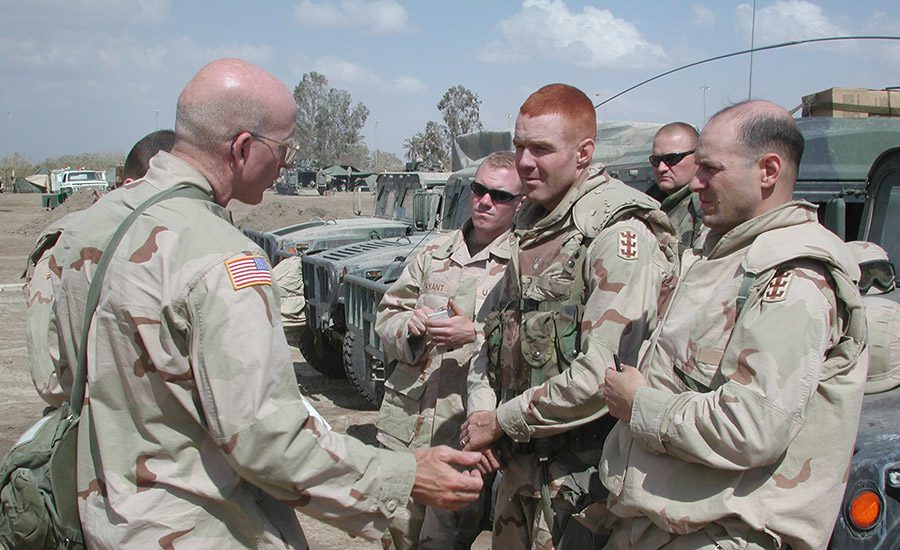Author: Gregg F. Martin, PhD, Major General, US Army (Retired)
November 11th is Veterans Day. It’s a national tragedy that more than 22 veterans a day commit suicide and that nearly two serving military service members per day die by their own hands. These are higher than the national civilian rates. And since 9-11, combat fatalities are less than 8,000, while more than 30,000 veterans and service members have taken their own lives. Mental illness is a leading factor in suicide, and stigma is the biggest barrier to getting help and hope.
As the last American soldier stepped aboard a C-17 cargo plane in Kabul in September, and became the last soldier to leave Afghanistan, my inbox was filling up with messages of despair from Afghan war veterans. They were witnessing a disastrous end to the war for which they put their lives on the line, and many are now feeling bereft, demoralized, and desperate.
Here’s a sample of what they wrote:
“I feel hurt, anger, resentment, anguish, rage, disbelief, powerlessness. My heart hurts.”
“I’m devastated, heartbroken, and so sad. Haven’t left my apartment for a week.”
“I’m in a very dark place.”
These are the voices of some of our very best Americans, who fought to defeat our enemies and build a better Afghanistan. They lost friends in battle and saw their buddies maimed.
While most troops are justifiably proud of what they did at the tactical, local level, they’ve seen their efforts go up in smoke. They’re angry, sad, hurting, and confused, and I fear that the mental health of some of them will unravel so unrelentingly they’ll take their own lives.
The risk of suicide is rising among veterans. A Rand Corporation report finds that between 2005 and 2019, the last year studied, the suicide rate has risen faster among veterans than it has for nonveteran adults. It now stands at about double the rate of the civilian population.

These Afghan war veterans are revealing themselves to me because they know I can identify.
In 2003, I helped lead US forces into Iraq. The rage and disgust I felt toward senior policy officials in the early days of the Iraq War are echoed in what Afghan vets are telling me today.
In Iraq, my comrades and I were sickened that misguided policies helped fuel the insurgency that crippled our war aims and led to the injury or death of thousands of our troops. I saw the consequences of tragic policy decisions up close on the battlefield.
In my case, those stressors combined with a genetic predisposition for bipolar disorder that expressed itself on and off the battlefield. By 2014, as I served as the president of the National Defense University, my bipolar disorder became acute, ended my career, and pushed me into a battle for my life.
I was tortured by vivid images of my own violent death, what psychiatrists call “passive suicidal ideations.” What started years earlier in Iraq has never left me.

How many Afghan vets are struggling with a mental health crisis of their own — or soon will?
I count myself lucky to be alive. I had a commander who ordered me to get a psychiatric evaluation, a wife and family who stuck with me, and a friend who helped get me into a Veterans Administration hospital, which provided excellent care.
Among the biggest factors in mental health disorders are depression, post-traumatic stress, traumatic brain injury, survivors’ guilt, and bipolar disorder. And when combined with trauma in relationships, legal issues, and financial problems, the risk goes up.
Bottom line: Reach out and contact a veteran. Help them the way I was helped. Ask how they’re doing. Let them vent or cry, or both. And listen. If they display despair, signs of mental illness, or suicidal thoughts, encourage them to get medical help immediately, and help them do so. Then follow up.
And for Afghan vets, check on yourself and your buddies, listen, and observe. Realize that it’s OK to not be OK. Recognizing and admitting a problem is a sign of strength, not weakness. And if you or your buddy is not doing well, go get medical help — immediately, as you would for a heart attack.
Given the insidious interrelationship between mental health and suicide, it could very well be a matter of life and death, this time off the battlefield.
 Gregg Martin, PhD, is a combat veteran, bipolar survivor, and retired two-star Army general. He is a former president of the National Defense University and a graduate of West Point and MIT. He lives with his wife in Cocoa Beach and is wring a book, “Battling Bipolar – my fight for mental wellness.” Visit www.generalgreggmartin.com
Gregg Martin, PhD, is a combat veteran, bipolar survivor, and retired two-star Army general. He is a former president of the National Defense University and a graduate of West Point and MIT. He lives with his wife in Cocoa Beach and is wring a book, “Battling Bipolar – my fight for mental wellness.” Visit www.generalgreggmartin.com
“The views expressed in this article are those of the author and do not necessarily reflect the official policy or position of the Department of Defense or the U.S. government.” This article was first published in the Boston Globe.
The content of the International Bipolar Foundation blogs is for informational purposes only. The content is not intended to be a substitute for professional medical advice, diagnosis, or treatment. Always seek the advice of your physician and never disregard professional medical advice because of something you have read in any IBPF content.


